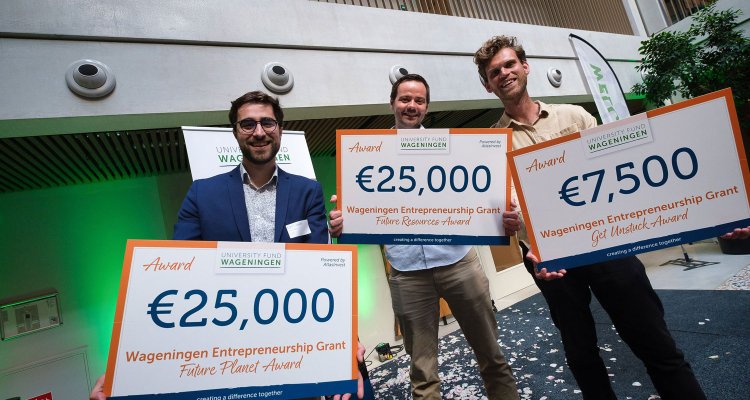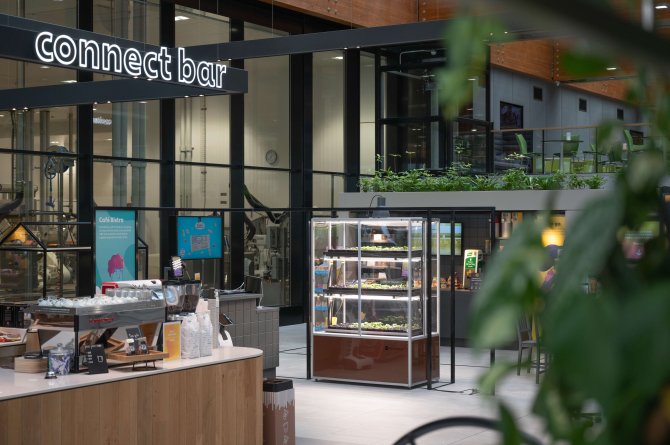
News
Entrepreneurship Awards for modular vertical farms and AI clothing sorter
Three young entrepreneurs won prizes at the finals of the Wageningen Entrepreneurship Grant last Wednesday 22 May. The prize is awarded annually by University Fund Wageningen in cooperation with StartHub and helps young innovative entrepreneurs take the first steps with their initiative. The Future Resources Award of 25,000 euros went to Bart van Gorcum of Valuesort.ai, who is developing an AI tool to effectively sort out second-hand clothes for value. The Future Planet Award of 25,000 euros was won by Nikolaos Alfieris of FarmVent, which develops modular vertical farms with fresh vegetables for chefs. Tom Kloosterman won the audience prize, the Get Unstuck Award worth 7,500 euros, with his initiative Blue Bagger.
Saving second-hand clothes
"It takes an employee an average of six months of training to properly sort second-hand clothes," Bart van Gorcum pitched during the battle for the Future Resources Award. He competed against finalists Matthew Halley of Soualigas, which converts waste on Sint Maarten into valuable raw materials, and Tom Kloosterman of Blauwe Bagger, which separates dredge into valuable resources. Van Gorcum of Valuesort.ai won over the jury with its AI tool to analyse clothes by brand, size and quality via a camera and robotic system, estimating the true market value of a garment. This allows sorting companies of second-hand clothes to work faster and resell the valuable clothes for a better market price. A much-needed innovation, as some 7.5 billion kilos of second-hand clothes are collected in Europe every year. The prize was very welcome for the entrepreneur: "Our current prototype is made of materials from the hardware store. With this prize money, we can make our next prototype a lot better."
Growing vegetables on-site
"Impressively small, impossibly big" is the slogan of FarmVent, the initiative of Nikolaos Alfieris. His modular vertical farms are reminiscent of a cake display case next to the checkout, but instead of sweetness, they promise the freshest vegetables and herbs that the cook prepares directly for you. The cook chooses which and how many microgreens to grow, and as an important side benefit: it hardly taxes the environment. The vegetables are grown via aeroponics, without pesticides and directly on-site. No Food miles are driven, saving CO2, fewer vegetables are thrown away by matching them to local demand, and it is cheaper for the user. Alfieris competed in the finals against Emiel Smits of Aeroponics Outdoors, who makes a tube system to grow potatoes up to five times faster, and Evelien Bos, whose initiative PetPanel offers pet food testing to producers, with pet owners testing at home with their pets.

Alfieris managed to convince the jury in several areas. Chairman of the jury and co-founder of the award Heleen van Poecke praised Alfieris for the narrative around their business model, the established partnerships, and his team. That Alfieris was competing for the second time was impressive to the jury. Van Poecke: "The jury likes perseverance. It is the mark of an entrepreneur, because progression is not linear."
Dredge is not waste
During the interludes, finalists could ask for help from the audience to fill gaps in knowledge, expertise, or contacts. For example, they asked for experts on thermodynamics, quantifying biodiversity, voluntary carbon credits and robotics. The finalists were also allowed to list a problem for which they could use the Get Unstuck Award money, €7,500. The public then voted on who they thought was most deserving of the award, with most votes for Tom Kloosterman. With the money, his team from Blauwe Bagger (Blue Dredge) will build an oven to bake PFAS-contaminated clay at a temperature where the PFAS disintegrates.